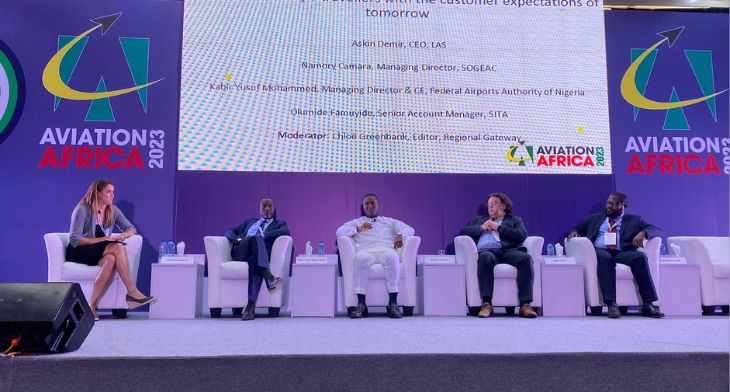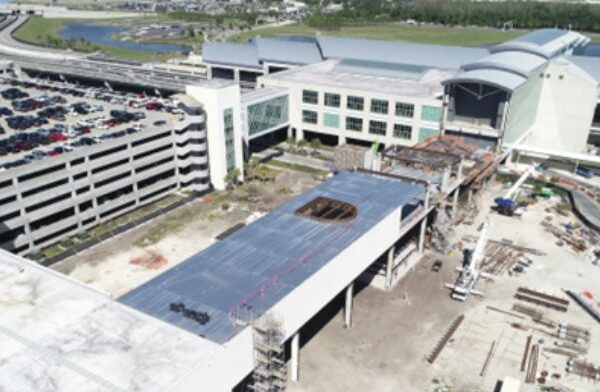


From biometrics and e-visas to smart security screening, data analytics and ensuring more efficient, sustainable operations the innovation and adoption of new technologies is enhancing efficiency and transforming the way passengers travel through airports on the African continent.
During a panel session on how airports are facing the future at the 7th Aviation Africa summit held in Abuja, Nigeria last week, airport leaders discussed how technology is taking airports to new heights by streamlining their operations, enhancing security, reducing delays and improving the overall passenger, as well as the employee experience.
Car parking made easy
Namory Camara, Managing Director of SOGEAC, which operates Conakry Airport in Guinea, revealed how as part of a major modernisation programme to upgrade his airport and enable it to handle up to 3m passengers, the airport has recently collaborated with Kiwi to deploy an online flight booking service and car parking app. Describing the latter as “one of the best parking systems in West Africa,” Camara explained, not only can payments be made by mobile which appeals to most Africans as credit/ bank cards aren’t widely used, but it has also revolutionised the passenger experience and increased non-aeronautical revenues for the airport. “It’s about making sure passengers have access to the same systems as elsewhere in the world, but also that when these solutions are applied it is with an understanding of the local market and how they will be used,” he continued.
Similarly, at Dakar Airport in Senegal, various technologies have been adopted to enhance operations since it opened its new doors six years ago, including operational software programmes to help monitor passenger flow and airport equipment, as well as a building management system to help ensure more efficient use of electricity. “The only thing I would do differently over the last couple of years,” said Askin Demir, CEO of Dakar Airport, is to “regain the time that was lost during the pandemic.”
Understanding the market
Meanwhile, speaking on behalf of the Federal Airports Authority of Nigeria (FAAN), Kabir Yusuf Mohammed, Managing Director and CE, FAAN, revealed that work is ongoing to modernise Nigeria’s airports. “We already have automated boarding gates, but they are not fully implemented as they require the accreditation of all the stakeholders,” he said.
He also noted that one of the challenges currently with passengers in Nigeria is that they tend to travel to the airport in large groups of family and friends. “We’re trying to make the whole process more efficient and seamless, so are using technology to make sure that only the travelling passengers get access to certain places within the airport and to improve security.”
All panelists were in unison that there is a need for airports to use the data collated from all these systems more effectively. “I don’t know how many airports in Africa are making decisions based on their data. Owning the data and using it in when it comes to decision making is key,” said Camara.
Similarly to Conakry, a new automated car park booking system has also been introduced at Abuja and automated entry gates on arrival at the airport. While there is a focus on introducing new technologies, Mohammed reaffirmed, “this also comes with significant investment which can present its own challenges, as well as capacity development and in some instances, the need to train personnel.”
Biometric revolution
Adding the perspective of a technology provider, SITA’s Olumide Famuyide explained that when it comes to biometrics, it’s important to look at the micro drivers. “In terms of the population Africa has a vast population, which currently stands at 1.2 million people and will be soon be at 1.7 million and counting. It’s a huge potential market in terms of tourism and travel, so in order for airports to be able to help facilitate this growing number of passengers and the necessary entry requirements and security concerns, biometrics will be key.”
Self-service check-in kiosks and bag drops are also a rapidly growing market with these solutions increasingly being rolled out to help create a more seamless experience. The panellists did point out however, that airports are not the only stakeholders when implementing these solutions. Government authorities and airlines also have a role to play here, especially in ensuring passengers are aware of how and when to use self-service options. To this end Famuyide explained that SITA has worked with Addis Ababa Airport in Ethiopia on a trial to slowly introduce self-service kiosks to work with stakeholders in familiarising passengers with how they work and walk them through the whole process.
Bird strike, which is a particular challenge for many airports across Africa, was also raised by airlines as something that airports need to manage more effectively to mitigate the risk and avoid disruptions to travel and the associated financial implications. Across Nigeria, FAAN has deployed various measures and new technologies to tackle the problem with support in terms of funding from the government.
Mobile apps
On a more simple level, mobile apps used for wayfinding as well as to boost retail revenues are also being well received by passengers. In Dakar the airport’s mobile app has been downloaded by more than 10,000 users, while all the airports on the panel agreed that social media is being used more effectively to communicate with passengers as well as staff, helping to reduce delays, keep passengers informed and relieve any anxiety that many passengers have when travelling through airports.
“The digital divide is narrowing,” said Famuyide. “Even remote, regional airports have access to connectivity so can be linked up to services that are required to process passengers more efficiently.”
Elsewhere in the airport environment, automated services are improving the workplace, particularly in ground handling, where automated vehicles are increasingly being used to help transport passengers , load baggage and heavy goods, which in turn means more efficient allocation of staff resources. Simulators are also being used to help train staff from air traffic controllers to firefighters.
With sustainability never far from a conversation during this year’s summit, there was also enthusiasm for initiatives driven by technology, such as the use of smart technology to optimise energy consumption, automated lighting systems or more efficient waste management. All panellists credited the Airport Carbon Accreditation programme with helping drive the wider adoption of these technologies to reduce the respective airport’s carbon footprint, but airports also have to be pragmatic about what they can achieve and where their focus is.
“Sustainability goes hand-in-hand with stability,” pointed out Mohammed, with Camara adding, “I am currently catering for less than 1 million passengers per annum, so I need to balance any investment in sustainability with the return on that investment.” So, while airports are serious about working towards reducing their carbon footprint, many in Africa are not the big offenders. Sustainability is a global issue with many of the big culprits in aviation based in the West. “But there are things we can and are doing, such as more efficient route and slot planning, incorporating building management systems and intelligent lighting and water usage which can also help reduce operational costs,” agreed Demir.
Wrapping up the session with a look at the emerging technologies that could further transform African airports, Famuyide pointed towards 5G as being key to providing airports with access to better, faster connectivity both inside the terminal and outside for ground handlers, airline crew and pilots. “We need to start looking at these technologies that are within reach, as well as improving the basic infrastructure on the ground as not only do they come with cost savings, but also the opportunity to ramp up operations,” he concluded.
Header image: Left to right Chloe Greenbank – Editor Regional Gateway, Kabir Yusuf Mohammed – FAAN, Namory Camara – Conakry Airport, Askin Demir – Dakar Airport, Olumide Famuyide – SITA.





